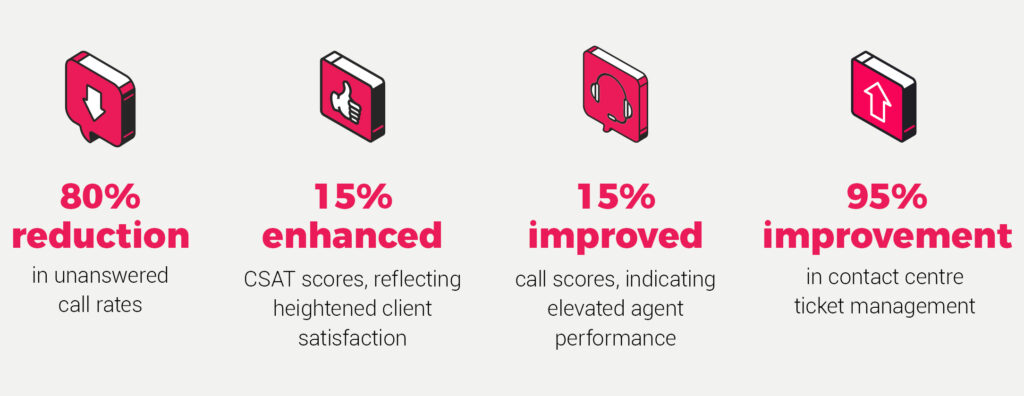iOCO.
Connect transforms client service at iOCO.
iOCO is one of Africa’s largest end-to-end technology solutions providers. Operating as the core technology company within the EOH Group, iOCO boasts an excellent track record of delivering professional Information Technology (IT) and Operational Technology (OT) services to diverse clients.
Part of the iOCO Group, iOCO Infrastructure Services specialises in providing comprehensive IT solutions for businesses, covering everything from design and deployment to management and support, whether on-site, remotely or in the cloud.
The company utilises a single service desk system with multiple tenants to serve all their clients. The service desk offers tailored services to meet each client’s requirements, enhancing their IT service management capability and experience.

“The clients contact centre solution supports 80 agents, who log calls, requests, and support tickets across 42 queues that service different client bases,” explains Penny Ngcukana, Engineer at iOCO Infrastructure Services.
These queues encompass external clients and multiple internal divisions within the broader EOH group across shared and ring-fenced hosted environments. Dedicated resources in the contact centre are allocated to support the ring-fenced environments and other high-priority clients to meet more stringent service level agreements (SLA).
The business need
The contact centre receives 10,000 calls a month on average across all client groups, with roughly 10% of tickets from within the group.
“However, when recurring telephony platform issues negatively impacted the business causing unsatisfactory service delivery, our only option was to look at an alternative platform to strengthen our Service Desk capabilities,” explains Penny.
“Clients regularly experienced engaged tones when contacting the contact centre, or abandoned calls due to long hold times. When they eventually got through, we often experienced issues with no bi-directional audio, which meant one party could not hear the other.”
In addition, ring-fenced clients often encountered routing difficulties, with the system directing them to agents outside their dedicated queue.
“Due to the complex nature of their environment and specific requirements, it was essential that these clients reached the correctly skilled agents via the assigned queue to effectively and efficiently address their issue,” adds Penny.
Agents struggled to log into the system at times while others experienced high latency, which meant they would seem on-queue and available to take calls when monitoring. However, calls would not route to them and they had to refresh their browser to resolve the issue. This would happen to different agents a few times a day.
“The impact on client service reduced client satisfaction (CSAT) scores, and unhappy clients would come down on service managers,” elaborates Penny.
“Client satisfaction is a priority for us, which means we cannot tolerate a client-facing system that does not achieve our minimum 99.9% uptime requirement.” Johan Bosch, Business Executive at iOCO Infrastructure Services.
“There were also concerns that clients would not renew their contracts due to non-compliance with SLAs and we also incurred financial penalties by failing to meet SLA parameters.”
Additional operational challenges included an administratively onerous reporting process where team leaders had to manually draw insights from multiple reports to present information to management every day in a bespoke format.
Managers spent 30 minutes per account every day manually compiling reports and roughly three hours on monthly account reports.
“It was administratively inefficient to meet these manual daily reporting requirements and was a drain on management resources,” continues Penny.
Faced with these challenges, iOCO made the strategic decision to find a solution that would deliver rapid improvements in service availability and delivery.
“Following an escalation in the amount of downtime experienced by the contact centre, with the Service Desk experiencing 210 minutes of cumulative downtime in March and April 2023, we decided to embark on a contact centre modernisation project to address these recurrent reliability issues and numerous other challenges in the process,” explains Johan.
The team conducted a desktop survey to explore various options, ultimately concluding that Genesys, a vendor with whom they have a longstanding history and experience was the most advantageous approach. “Based on our familiarity and positive experiences with Genesys PureConnect,” he asserts, “Genesys Cloud was the optimal choice.” The iOCO team, having been satisfied users of Genesys PureConnect for an extended period, found comfort in the interface and were pleased with the solution’s capabilities.
The solution
The iOCO team contacted Connect to find the appropriate solution within the Genesys stable. Following a comparison analysis in terms of functionality and commercial viability, the team determined that Genesys Cloud was the best fit-for-purpose solution.
“Following an internal due diligence process, we agreed on the commercial model and decided to move forward with Connect’s recommendations,” confirms Johan.
Before the migration, iOCO needed to perform an internal review of all call flows as their external vendor had managed this function and the supplied information was not comprehensive enough to perform the migration project.
“We started from the beginning with gathering more information on call flows and to determine which queues we would use,” recalls Penny.
This business analysis process took six weeks and provided iOCO with full visibility into the contact centre operations.
“We developed a full user inventory to determine if we needed to add additional capacity. We also determined which existing functionality we wanted to keep and which we could remove. Importantly, we identified the additional capabilities needed to create a more efficient and effective contact centre operation,” elaborates Johan.
From the business analysis, Penny explains that iOCO finalised all call flows and standardised queues for the services provided and determined the relevant schedules.
“We also determined our requirements for after-hours services and how the contact centre would handle overflows.”
After a six-week planning phase, iOCO successfully implemented Genesys Cloud two months later, adopting a staggered implementation strategy aligned with the number of clients served by the contact centre.
“We focused on first implementing the functionality we could leverage to optimise client service and rolled this out in a three-tier approach starting with the lowest priority group to allow us to troubleshoot any potential issues,” continues Penny.
The team allocated three weeks to train the relevant agents and implement the solution before moving to the next priority group.
“Before going live, a Connect trainer conducted user training sessions with multiple groups of 10 agents at a time. We followed up the formal training with internal sessions and consistently received positive feedback about the training and the trainer’s willingness to assist agents,” Penny Ngcukana, Engineer at iOCO Infrastructure Services.
Connect also provided all supervisor and administrator training. Agents who missed training sessions were rebooked, and follow-up sessions were provided where necessary.
“After the comprehensive training, everyone was comfortable with the system and got up and running immediately. The trainer was readily available for follow-up questions when we went live with each group,” adds Penny.
The outcome
“The first few implementations went smoothly. Apart from minor challenges on one of the days from the voice provider, which caused routing issues, there were no problems from a Connect perspective.”
This experience gave iOCO the confidence to bring forward the planned rollout for group three – the highest priority group, which happened without incident. Overall, the entire project, from planning to full migration, took just four months.
Since going live, the iOCO contact centre has reduced unanswered call rates from more than 5% to less than 1%.
“The failover capabilities unavailable to traditional contact centres means we now have a truly 24/7 operation, with calls routed to staff in the operational centre who can service clients and generate tickets, which we could not provide previously,” explains Penny.
Since the Genesys Cloud implementation, agents no longer experience the high-latency that affected incoming calls and calls are routed as desired to available on-queue agents.
Johan adds: “The Genesys Cloud solution also supports a distributed workforce, with agents able to log on from any of the four iOCO office locations around the country or from home to support staff in the centralised contact centre, which adds additional resilience and redundancy, and creates opportunities for hybrid working.”
From a technical perspective, Penny explains that iOCO has enjoyed many benefits since its implementation.
“We can now on-board new campaigns ourselves, which we can build from beginning to end. The platform’s ease of use from an administrative perspective has also been transformative for the team leaders.”
The automated and customisable reporting functionality ensures managers can quickly and easily generate reports populated with all the relevant information they need, reducing their daily and monthly administrative burden and freeing them up to focus on value-adding operational functions.
Daily reporting now works as a simple run-and-send function, and managers require just 30 minutes to run, verify and send the monthly reports, saving them over two and a half hours.
Most importantly, the Genesys Cloud solution has improved call scores by 15%. Call quality has also improved, along with system stability, with the Service Desk experiencing 100% uptime between September 2023 and February 2024.
“We have received many accolades from clients, who are very happy with the level of service they now receive, and from staff who value the enhanced agent experience,” adds Johan.
“Agents are more efficient and can handle more calls. They are also happier as working in the contact centre is less frustrating for everyone.”
The iOCO team has benefited from the improved dashboard capabilities, with real-time agent monitoring capabilities creating a more dynamic and responsive operation in addressing changes in call volumes and agent availability.
“We now have more control and flexibility to make real-time changes to the contact centre environment, improving our ability to respond to client needs in an agile manner,” says Penny.
The call recording and quality assurance (QA) tools have also assisted with staff training, with more granular information available to share with staff, which creates harmony between the team and transparency in terms of performance.
“We also get great support from Connect. Their team is very responsive and we always get a quick turnaround on support requests since migrating to the new Genesys Cloud system. Based on this combination of factors, we have seen our SLA compliance from the contact centre ticket management improving to a consistent 95%, which is a level we could not meet on the previous solution,” concludes Johan.

About‘Connect.
Connect combines global contact centre and customer experience (CX) expertise, deep domain knowledge, and unparalleled industry skills to make the complex, simple. Since 1990, we have leveraged our vendor-independent managed services approach to digitally transform how organisations communicate, both internally and externally. We specialise in combining the most relevant technologies and services from leading vendors and platform providers to create opti-channel engagement solutions, orchestrating frictionless experiences and simplifying complex communication challenges.
Connect with us Connect UK, Connect South Africa, Connect India, Connect USA.
Related case studies.
Find out how we can help your business communicate better.
To discuss your communications challenges and requirements, get in touch with us today.
Connect with us now.
New web: Contact Us
"*" indicates required fields


